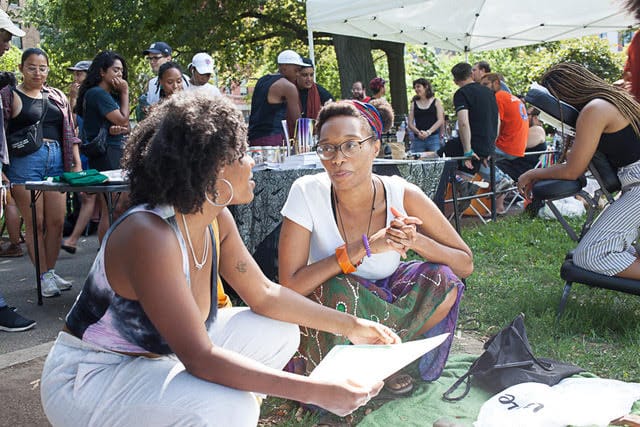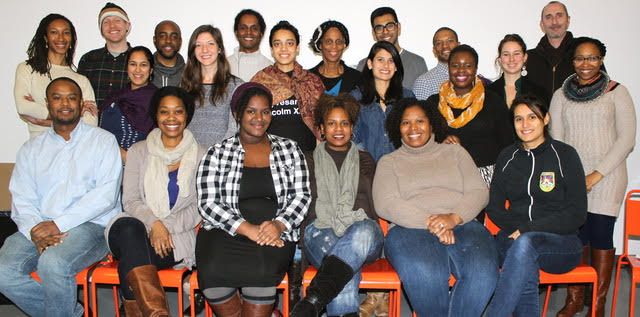Black-Led Coop Wants to End Food Inequality in Bed-Stuy and Crown Heights


BEDFORD-STUYVESANT – While high-priced grocery chains and specialty food stores are popping up across Brooklyn, many residents still lack access to affordable quality food in their community. Food inequality has long plagued low-income neighborhoods and has defied effective solutions.
In 2008, city officials launched the Food Retail Expansion to Support Health Program (FRESH) and others efforts like the Healthy Bodegas Initiative two years before that to increase the availability of reasonably-priced healthy foods in neighborhoods with a shortage of grocery stores. However, the programs have not fully delivered what many hoped they would. An investigation by CityLimits.org found that FRESH succeeded in “bolstering the market for food, but made less apparent progress at filling gaps or reducing disparities in New Yorkers’ access to fresh produce.”
The Central Brooklyn Food Coop (CBFC), a black-led cooperative, is taking matters into its own hands in Bedford-Stuyvesant and Crown Heights. According to its website, CBFC seeks to “ensure access to affordable and fresh food within the mostly-of-color, low- and moderate-income communities of Central Brooklyn.
CBFC, which has been a work in progress for more than five years, launched a Kickstarter campaign on Oct. 16 to take the food coop to the next level.
“We’re trying to raise $25,000, which is not going to get us a building but could help toward a down payment and rent,” Mark Winston Griffith, a CBFC board member, told Bklyner. “The food coop is slated to open in the spring of 2020. Up to this point, we have been building the internal structure. Now we’re looking outward to build support.”
A food coop is a neighborhood grocery store that is owned and operated by members of the community. It serves as an alternative to corporate-owned supermarket chains and other privately-owned places to shop for food. Coops can provide affordable, healthy foods, as well as other services such as information about healthy living.
“The bigger story is that we’re building a black-led food coop in a community that’s in the throes of gentrification,” said Griffith, who is also the executive director of the Brooklyn Movement Center that originally organized and incubated CBFC.
He continued: “We’re building something for people who have, in some ways, been made invisible by the current food system. So, the Kickstarter is a big step toward us becoming public and making a case for why this needs to be supported.”
Community is the heart and soul of food coops. Residents pay a small fee to become members, which entitles them to shop there, elect board members and offer meaningful input about the coop’s products and services. At the same time, membership requires a commitment to volunteer at the grocery store. There are several food coops scattered across Brooklyn.
To get off the ground, Griffith said CBFC needs at least 250 members by the time it acquires property and 500 members when the doors open.

“Over the course of time, we will need thousands of members to make it sustainable,” he stated. “We will need assistance in terms of elected officials, getting below-market real estate, and philanthropic support. Over time, the need for outside funding will diminish greatly.”
The need for a food coop in Central Brooklyn has deep roots, according to Griffith. He said conversations about access to affordable, high-quality food for black Brooklynites go back more than a century. The situation became urgent in the 1970s with the flight of supermarkets from low-income urban communities to the white suburbs and the practice of food redlining, in which supermarkets decline to operate in poor urban neighborhoods.
Today, food inequality in Crown Heights and Bed-Stuy exists in the context of gentrification. “Policies that create incentives for a new supermarket to locate in a low-income community may increase food access but also make the neighborhood more attractive for more affluent newcomers,” according to the CUNY Urban Food Policy Institute. Inevitably, grocery prices skyrocket.
CBFC’s mission goes beyond providing an affordable alternative. “We’re looking to sell food but also to create relationships with local farmers and other distributors,” Griffith explained. “We want to create a whole ecosystem of food. It’s not just about consumption but it’s also about supporting other people who are in the food economy and making sure black folks are at the center of it.”
That places CBFC in the broader cooperative conversation across the city.
“We are self-consciously black but very much in solidarity with the broader economic democracy movement in New York. We’ve have gotten a lot of support from Greene Hill Food Coop and Park Slope Food Coop. We see ourselves as part of this multiracial economic democracy movement,” Griffith added.




